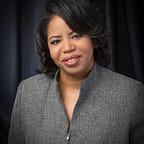My TEDx Talk: Your Narrative is Your Super-Power and My Wonderful TEDx Experience
Having been invited on panels and organized and facilitated panels as well as speaking at various UN events and even lectured at colleges and universities, my TED experience had to be one of my most enlightening experiences to date. I truly appreciate being invited to speak at Portland Community College-Rock Creek TEDx event. The event was the college’s first TEDx event and I believe it made history as being one of the few community colleges to host a TEDx. I am glad to be a part of that history and in helping the college in any way possible to make the event a success. The event had a great list of speakers, audience members and stage and media crew. Please see my TED talk here or below: Your Narrative is Your Super-Power
I love TED talks; however, after my TED talk, I was even more sold on TED talks than before. It is because of the surprising interaction after the TED talk. Some in the audience came up to me to express appreciation that I shared my story, as they too had similar experiences and never could express these experiences out of fear and shame.
I briefly met someone who expressed she was in the process of writing her life story. She was in the process of sharing more of her story with me, but I could not talk in detail due to the others standing in line to talk to me. I also met others who shared important experiences and wanted my thoughts on certain things.
After the TED talk, I realized how my message resonated with them and others. So, I want to answer their questions or comments more in detail, along with others I could not talk to longer. Here’s my response to them:
First, I so appreciate that you shared your experiences with me and that I inspire you to find creative ways to move forward. I feel honored that you shared your experiences with me.
Second, to answer your question on the process in writing Bernice Rathe. In writing Bernice Rathe, I was extremely hesitant in revealing my experiences in any format (fiction or not). It was because my experiences are so unique that I just knew no one would ever understand me or believe me. I struggled with whether to write it, then I struggled with whether to publish it.
But, after seeking advice from others, it was clear that I needed to share what I experienced, since my experiences had profound messages for all of us. I did so in fictional narrative art form, since it allowed me creative freedom to tell exactly what I endured, who did it, how I made it, why I experienced these things, the extent of my experiences and how I felt and how those experiences impacted my life. Additionally, it allowed me to rewrite my circumstances with creative flare and imagination.
When I finally decided to write Bernice Rathe, as I stated in my TED talk, I did not worry about writing perfect. I just wrote and wrote and wrote and eventually I finalized it and tucked it away. I thought that was enough, I wrote it and I got it out. In fact, those close to me knew of the book but never read it because I kept it hidden in a box somewhere collecting dust for years. Seriously!
I hoped that they forgot that I wrote a book. Nope! They tried so desperately to get a copy of the book but I held it close.
To answer the question on how long it took me to write it: It took me little time to write but it actually took me three years to get the guts to publish the book. Even then, I did not tell anyone until months after I published the book and that I wrote under a pen name. Actually, it was not until TED that I revealed my pen identity and the book detailing my life story.
To the question on what helped me in expressing my experiences: Finding creative ways was key for me. Fictional narrative art was one vehicle for me, since I was able to write about my life story without limitations, i.e., it provided creative freedom.
While in my TED talk I did not focus on the scientific evidence that suggests that art, in particular narrative writing (and other forms of art), can be healing, since I did not want to be that speaker with a zillion PowerPoint slides about scientific evidence and bore the audience with jargon, there is scientific evidence that supports narrative art. That’s for another TED talk. [I think I probably got a host of other topics for other TED talks. Again, that is for another time.]
Anyway, my goal was to spread a positive message and give the audience and future viewers ideas and innovative ways on translating their experiences. I hope it was helpful.
Finally, my special messages to all of you who I met: rock on . . . you are strong . . . be unapologetic, unafraid . . . stand in your truth and own it!
